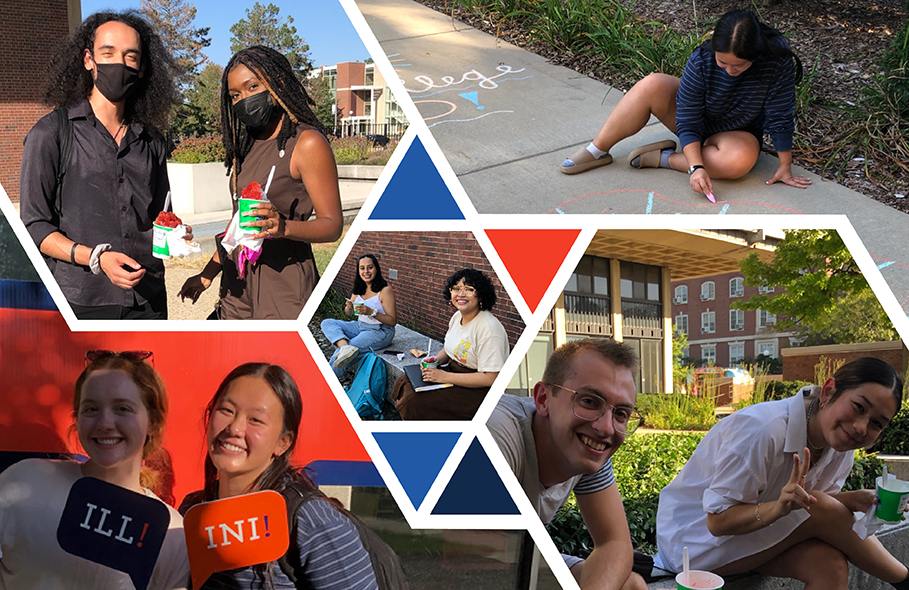Bringing us Back Together: Supporting a Community of Learners
by Ashley Lawrence / Oct 22, 2021

This fall, the College of Education saw more than double the usual number of new undergraduate students walk through its doors for the first time—new in non-transcript terms, anyway. Education at Illinois juniors—while in their third year of college—had only one full semester of in-person classes prior to the shutdown caused by the COVID-19 pandemic. Both sophomores and incoming freshmen classes had had no in-person, on-campus learning experiences, at all.
Not a single lecture attended in an Education Building classroom; not one visit to the Student Academic Affairs Office to chat with an adviser; zero trips to the O’Leary Learning Center to meet fellow students for work on a group project.
Sarah McCarthey, then the acting associate dean for undergraduate programs and director of teacher education, saw the proverbial writing on the wall.
During the long 2020-21 academic year, as the pandemic continued disrupting education, the Curriculum and Instruction department head became aware of students’ intensifying academic and social-emotional struggles. She saw their learning experiences being affected by social isolation, lack of individualized academic support, and minimal peer collaboration. She, and others, were concerned about the eroding sense of community among the College’s student body.
Rather than chalk it up to more educational experiences lost and move on, McCarthey—together with Program Coordinator for Elementary Education Lynn Burdick and staff in the Student Academic Affairs Office—doubled down. They submitted an Innovative Programs grant proposal to the campus Provost’s Office, intended to create an environment of robust support for the College’s undergraduate students. The Bringing us Back Together: Supporting a Community of Learners project was awarded funding just as Fall 2021 classes began.
In-place Community Space
True to its name, the project kicked off with a social event on September 28 that brought students together at the Education Building. Weather was perfect for outdoor and indoor games, as well as a surprise visit from the Kona Ice truck with free sno-cones for all.
“Students from all the College’s undergraduate programs (Special Education, LES, and all C&I licensure tracks) and all years attended,” says Burdick, who is serving as the project’s coordinator. “There were groups of students in the same program who sat together and played board games, enjoying each other in a social, rather than academic, setting. The best comment I heard was a student who thanked us as they left, saying they were so glad to have met people from other programs.”
Burdick, who is working with student leaders from Epsilon Delta, Strengthening and Empowering Educators of Diverse Statuses (S.E.E.D.S), and Student Education Association (SEA), says the plan is to host a social event for all Education students once a month.
As part of Bringing us Back Together, Room 311 in the Education Building is now redesigned as a community room with comfortable seating, a maker space, and study and work areas. Crafts and board games are always available in the space, and the snacks that are provided don’t hurt its appeal, either. Room 311 is open to everyone each Tuesday through Thursday from 3 to 6 p.m., as well as Wednesdays from 11 a.m. to 1 p.m.
Enhanced Writing Support
During the months of remote teaching and learning, McCarthey, also a faculty member of the campus’ interdisciplinary Center for Writing Studies, identified a need among Education undergraduates—especially freshman—to development better writing skills. Across the board, in online format Education students struggled to complete and pass RHET 105, a foundational writing course required for teaching licensure. McCarthey is currently addressing this by collaborating with Interim Associate Director of Rhetoric Dana Kinzy and other faculty and graduate students to revise literacy sequences and incorporate multimodal writing components in RHET 105 and subsequent literacy/writing course curricula.
“Dana Kinzy has provided insight and expertise in guiding our students,” said McCarthey. “To successfully integrate multimodal teaching technology, all RHET 105 and literacy course instructors will receive targeted training through the Bringing us Back Together project,” she said.
Since writing support is a key component of the initiative, a teaching assistant is available in Room 311 every Tuesday and Thursday from 4 – 6 p.m. for drop-in help with writing projects. Students can bring any writing assignment for any course they’re taking and get individualized attention. Bringing us Back Together writing tutors are familiar with the requirements of Education courses, therefore able to meet the unique needs of Education students.
“Basically, we have our own Writing Center here in the College,” says Burdick. “Since Room 311 has opened, students have used it to meet with writing tutors, take advantage of a comfortable place to work, and even gather with friends. Two instructors (Michael Foellmer and Adam Poetzel) are using it as a place for their students to do coursework together,” she says.
“Bringing us Back Together would not be possible without Lynn’s leadership and passion,” said McCarthey. “We also have an excellent staff of undergraduate students who are creating activities within the space and look forward to upcoming events and its increased use.”
Stop by Room 311 in person or view the College of Education calendar to learn about the next social event.